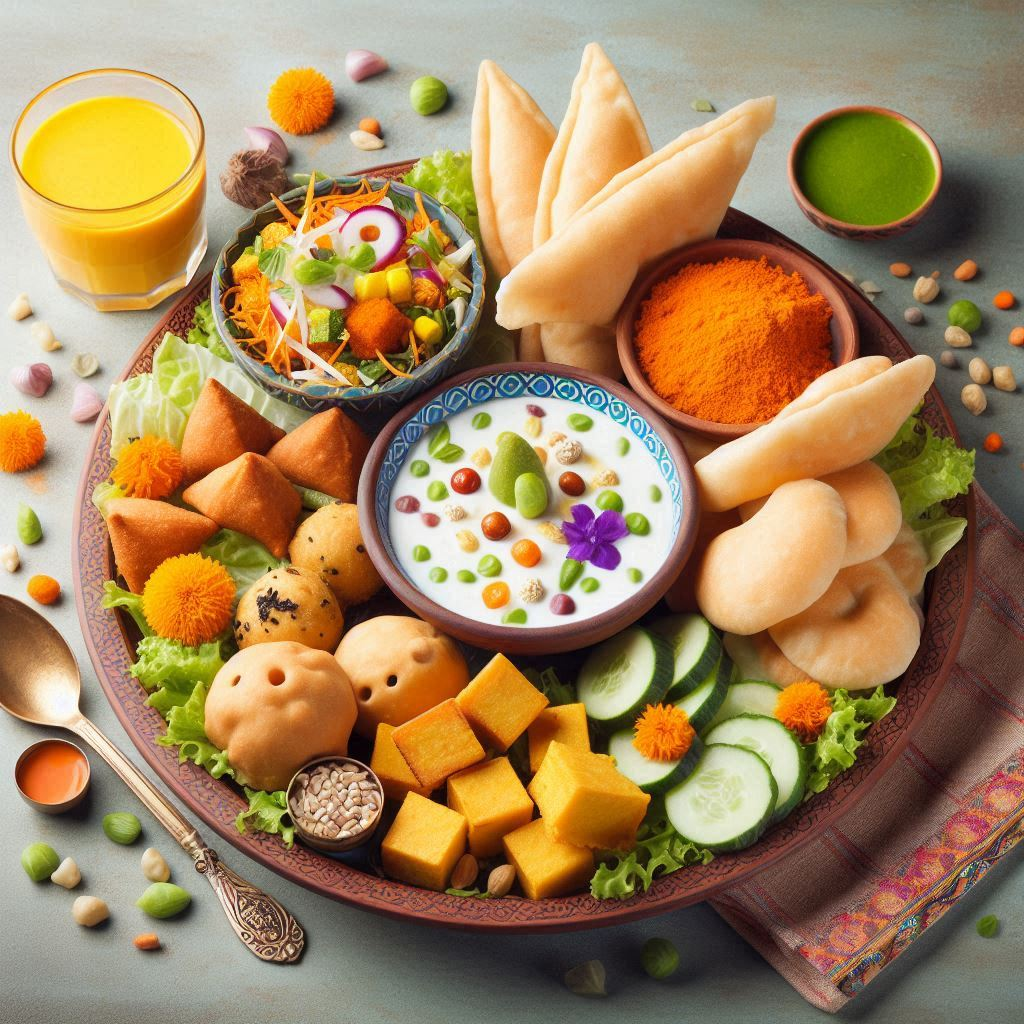
Nourishing Your Body: A 9-Day Navratri Diet Guide for Energizing Fasting
9-day Navratri diet plan to help you maintain a healthy fasting routine while honoring the traditional aspects of the festival. This plan emphasizes nutritious and energizing foods that are typically consumed during Navratri, focusing on fruits, vegetables, and grains allowed in fasting.


Navratri Diet Plan
Day 1-9: General Guidelines
- Hydration: Drink plenty of water, herbal teas, or coconut water.
- Snacks: Choose nuts, seeds, and fruits as snacks.
- Cooking: Use minimal oil; prefer steaming, boiling, or grilling.
Daily Diet Chart

Breakfast: Smoothie with banana, almond milk, and a spoonful of flaxseeds/ Sabudana khichdi with peanuts/ Banana pancakes made with Besan.
Mid-Morning : Fresh fruit smoothie/ Seasonally Fruits / Coconut water/ Buttermilk or chaas.
Lunch: pulao with mixed vegetables/ Aloo-palak curry with rice + Roti / Sabudana vada with yogurt.
Evening Snack: Carrot and cucumber sticks with hummus / Baked sweet potato fries / Grilled corn / Roasted makhana.
Dinner : Vegetable soup with a side of boiled vegetables/ Mashed sweet potato with steamed broccoli / Dalia / Roti + Sabji
Tips:
- Moderation: Avoid overeating, even with allowed foods.
- Balance: Ensure a good mix of carbohydrates, proteins, and healthy fats.
Special Tips for a Healthy Navratri Diet
- Stay Hydrated:
- Drink plenty of water, herbal teas, and coconut water to stay hydrated. Dehydration can lead to fatigue.
- Balanced Meals:
- Ensure your meals are balanced, incorporating a mix of complex carbohydrates (like millet and buckwheat), healthy fats (from nuts and seeds), and protein (from legumes and dairy).
- Listen to Your Body:
- Pay attention to hunger cues and eat only when you’re genuinely hungry. Avoid overeating during meals.
- Avoid Processed Foods:
- Steer clear of processed snacks and foods that may contain unhealthy additives. Opt for whole, natural foods instead.
- Limit Sugar:
- While fasting, it’s easy to indulge in sweets. Limit your sugar intake and choose healthier alternatives, like fruits or natural sweeteners.
- Regular Meals:
- Try to have regular meal times to maintain energy levels. This can help prevent excessive snacking or binging later.
- Include Fiber:
- Incorporate high-fiber foods like fruits, vegetables, and whole grains to aid digestion and keep you full.
- Practice Portion Control:
- Be mindful of portion sizes, especially with calorie-dense foods like nuts and fried items.
- Opt for Healthy Snacks:
- Choose snacks like roasted nuts, fruits, or vegetable sticks instead of fried or heavy snacks.
- Stay Active:
- Engage in light exercises, yoga, or walking to keep your energy levels up and promote digestion.
- Mindful Eating:
- Focus on your food while eating, savor each bite, and avoid distractions like TV or mobile devices.
- Plan Ahead:
- Prepare your meals in advance to avoid the temptation of unhealthy options during busy days.
- Include Probiotics:
- Consider adding probiotic-rich foods like yogurt to aid digestion and boost gut health.
- Rest and Relaxation:
- Ensure you’re getting enough sleep and taking breaks to relax, which can help maintain your energy levels.










